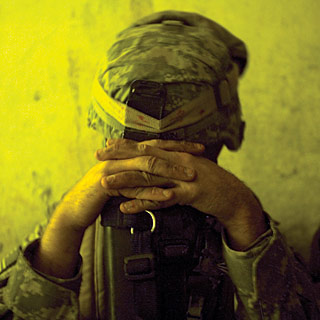After U.S. Army Sgt. Douglas Hale, Jr. finished 15 months in Iraq for his second combat tour, it was obvious that things in his life were awry. In 2007, he was diagnosed with severe depression and post-traumatic stress disorder. He began drinking heavily, and his marriage fell apart. In early 2009, Hale abandoned his post at Fort Hood. Last May, he was arrested for being absent without leave and returned to Fort Hood. Before the month was out, he tried to kill himself.
T he Army sent Hale for treatment at a psychiatric hospital in Denton, and it seemed to help. He spent the Fourth of July weekend with his mother, and she drove him back to Fort Hood the next day. On July 6, his mother received a text message from him that said, “I love you mom im so sorry I hope u and family and god can forgive me.” She immediately contacted Army officials at Fort Hood and started driving back. But Hale had already shot himself in the head.
he Army sent Hale for treatment at a psychiatric hospital in Denton, and it seemed to help. He spent the Fourth of July weekend with his mother, and she drove him back to Fort Hood the next day. On July 6, his mother received a text message from him that said, “I love you mom im so sorry I hope u and family and god can forgive me.” She immediately contacted Army officials at Fort Hood and started driving back. But Hale had already shot himself in the head.
Army officials are reportedly searching for solutions regarding the suicides of soldiers like Hale, but they’re not looking real hard. The answers are right under their noses.
War is hell under any circumstances. But in the case of Americans serving these days in the Middle East, it’s worse than that — it’s a planned, coordinated societal psychosis.
If you plop a normal, all-American boy or girl down in a psychotic situation for months and years at a time, tour after extended tour, psychosis or extreme disturbance is not an abnormal response. And it can lead to suicide. Especially when the nation that sent these men and women into harm’s way still hasn’t clearly justified why this madness was necessary.
I read an Associated Press story the other day that suggested that one of Big Pharma’s wonder drugs was killing American GIs. It said that many of the soldiers serving in and returning home from the wars in Afghanistan and Iraq were taking a drug called Seroquel to help them deal with chronic restlessness, severe insomnia, and constant nightmares. If I were a soldier it might have made me laugh.
Seroquel, according to the story, is a “potent antipsychotic.” Instead of reducing combat tours to reasonable timeframes, limiting the number of tours a soldier has to endure, or simply removing unstable soldiers from these ill-conceived wars indefinitely, the U.S. military is apparently using our men and women in uniform as guinea pigs for a soldier’s-little-helper pill that will supposedly desensitize them to the insanity around them.
It doesn’t cure the psychosis. It simply allows unstable soldiers to function within the insanity without being terribly bothered by it. And when you combine Seroquel with antidepressants and anti-anxiety drugs — something military officials suggest is an acceptable “standard of care” for soldiers or veterans suffering from post-traumatic stress disorder — it’s not surprising if they walk around in a cognitive fog.
In this regard, isn’t the military’s attempt to pharmaceutically abridge the humanity of our soldiers plainly evil? If you have to give someone a potent anti-psychotic to help them deal with what they’re doing or what they’ve done for you or God or country, then there’s obviously something wrong with what you’re asking them to do. It reminds me of perhaps the grimmest excerpt from Erich Maria Remarque’s All Quiet on the Western Front: “We were eighteen and had begun to love life and the world; and we had to shoot it to pieces. The first bomb, the first explosion, burst in our hearts.”
Oh, and did I mention Seroquel is more than just one of the military’s most frequently prescribed drugs? It’s also the fifth best-selling drug in the nation. So if our psychotic naiveté and ignorance ever start to really get to us, we can always knock them back with our own dose of a brain-fuddling stupefacient. In fact, we’ve already been at it.
In 2008, American emergency rooms treated a million people for abusing prescription drugs and over-the-counter medicines, roughly the same number of folks our ERs treated for heroin and cocaine overdoses or abuses of other illegal drugs — and this number doesn’t even factor in alcohol.
We’re taking the edge off our insanity any way we can. The only war more stupid and psychotic than the one in Iraq was the one on drugs. But it’s been going on so long that its mention no longer even penetrates our daze.
The military-pharmaceutical complex is making a killing or, more specifically, making a fortune off the folks we’ve asked to do the killing — and off the rest of us. They dope our unruly kids, they dope the young men and women fighting in and returning home from the war, and they dope the rest of us right here at home for being sick of wars overseas and fearful of war on the middle and lower classes and dreading the reckonings to come and being ashamed of our own sad national shadow.
And the treatment is working. Thank God we’re more susceptible to psychotropic manipulation than Sgt. Hale was.
E.R. Bills is a Fort Worth-based writer whose work has appeared in numerous publications.











